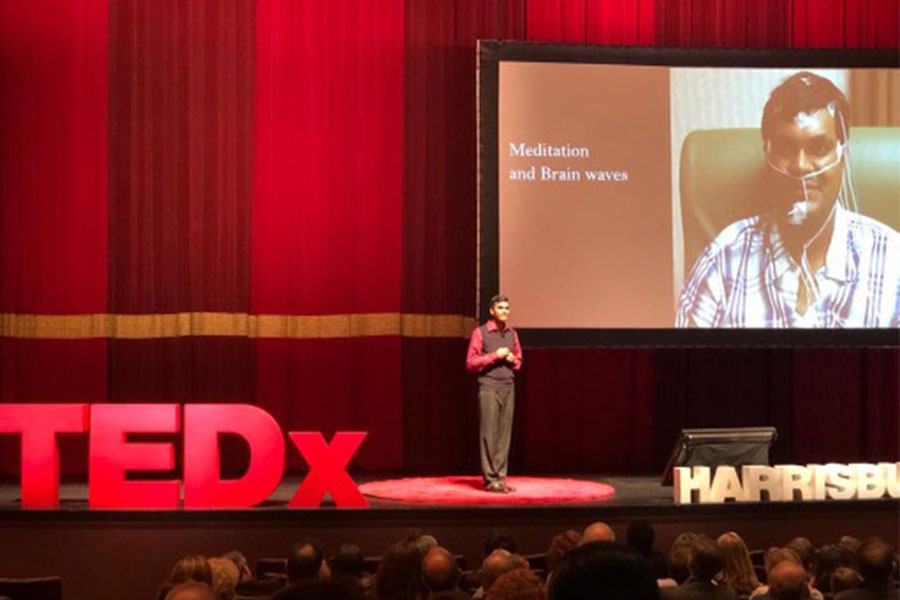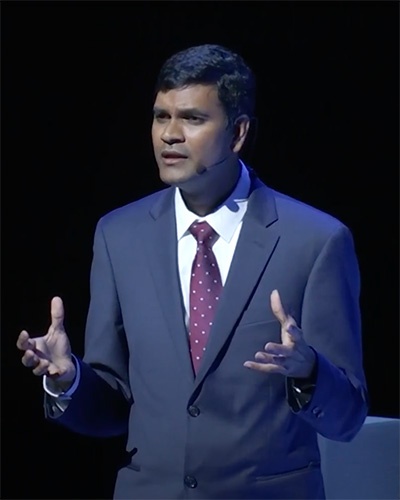As we enter another new year again, it’s time to unwind and connect more with your healthy self. With the last few years thrusting you into a new normal, it has turned stressful in many ways. Stress when unchecked can lead to chronic health problems. Medical research estimates that nearly 90 per cent of illnesses are related to stress. A few minutes of meditation a day can create a sense of serenity and balance in your life. Besides, it can enhance your emotional well-being as well as your general health. So, why not have a Heartfulness regimen on your calendar this year? Heartfulness is a simple approach to meditation where you focus on your heart to cultivate inner strength and tranquillity.
Jayaram Thimmapuram, MD, is an acclaimed meditation expert and holistic wellness coach and a practitioner of Heartfulness Meditation. He is also an author and currently an academic hospitalist in Internal Medicine at the WellSpan York Hospital, Pennsylvania, US. A recipient of the Gold Humanism Award and multiple outstanding teacher awards, he is a well-known TEDx speaker as well. Jayaram speaks on how Heartfulness Meditation, an ancient meditation technique, can help in your daily life. Read on how alleviating everyday stress through meditation can enhance your mental state and a person’s overall health.
Could you explain how you came to be interested in meditation?
My parents inspired me to meditate. I was 18 when I tried Heartfulness Meditation, right before I joined medical school. Initially, I did not have any notable experiences. I followed my father’s recommendation and practised for a period of six weeks. During this time, I was supported by Heartfulness trainers, who meditated with me once a week. During one such session, I had a wonderful experience. It was one of the deepest sessions I have experienced. I felt as if my mind was completely blank like a clear sky without any clouds. My mind was empty; there was clarity and subtle bliss. Similar experiences created subsequent changes in my outlook, and I adopted this as a lifelong support system.
How much has meditation helped you in your work life?
It is essential to feel peaceful at heart and be calm in mind when we work in highly stressful environments. In public-facing professions like medicine, we constantly navigate volatile emotional states. When we deal with patients and their families, the severity of the disease and the patient’s response, and how the family copes with bad news, these all affect us. I consider myself fortunate to have found the practice of Heartfulness at a young age. The training I received through meditation augments my medical practice. It gives me that little extra edge to handle my own emotions and not get swayed. From this stability, I comfort my patients.
A calm, uncluttered mind can detect patterns and see things that could be easily missed. Diagnosis becomes effective. Sometimes there is an intuitive understanding of the case at hand and how best to deal with it. Others cultivate this mindset through music, exercise, yoga, and in my case, it has been Heartfulness meditation. All I need to do is take a few deep breaths and settle in the heart, I am ready to work in no time.
One significant contribution Heartfulness brings to our medical teams is the ability to handle trauma. First and foremost, we are humans, and then doctors. When we lose a patient it rattles us, and the helplessness we feel at the time could be devastating. Through the practice of meditation, we accept our limitations and learn to accept the reality of life, and gently let go of these debilitating emotions. The positive aspect of care is useful to the patient, but cannot be consumed by it so much that it affects the care of the next patient.
Could you explain the concept of Heartfulness Meditation?
Heartfulness meditation is a simple heart-based meditation practice that is supported by Yogic transmission or pranahuti.
The focus is on the heart, which is the seat of all feelings and emotions. During meditation, we may have thoughts but we learn to ignore them and dive deeper into the heart. As a result, meditating on the heart develops one’s emotional intelligence, sensitivity, and intuition. It is a practical experience that makes one dive deeper into oneself and experience the deepest state of calmness within oneself.
There is also a simple technique called ‘Cleaning’ to remove one’s past emotional baggage, which helps address feelings of discontentment, restlessness, anxiety, anger, fear, and most such negativity from our system. The inner transformation one experiences enable positive qualities such as contentment, calmness, compassion, courage, and clarity.
Is it difficult to learn Heartfulness Meditation?

It is very easy to learn this practice. There are no do’s and don’ts, nor dogmas associated with this practice. It is a simple attitude of testing the practice and following one’s own heart’s voice.
This is a wonderful and simple tool for relief from stress and anxiety, which enables total wellness – physical, mental, emotional, and spiritual. Recent research work done by the Heartfulness Institute has proven how it alleviates burnout and is extremely effective in increasing productivity, emotional wellness. Even the telomere length is elongated, as published in a recent study. When one harnesses the benefits and feels the change in oneself, they are inspired to continue with it, and learn more and experience more and do more.
How can it enhance one’s mental state and overall health?
Our lifestyles are hectic, busy, fully engaged digitally. When the pandemic hit. the first thing we learned is the necessity for connection. Human to human, and heart to heart. We started seeing the downside of our lives very quickly. The alarming increase in depression, loneliness, and other mental health-related issues are taking a toll on our infrastructure.
A simple practice like Heartfulness meditation can unburden and support the medical practitioners and support staff, first by relieving them of their own emotional baggage and building resilience.
When we teach patients to meditate on the heart, we are allowing their minds to rest on the best part of themselves. It is surprising for them to discover that all the help needed was already present in the heart. A matter of pause, a moment of connection, and witnessing the process of harnessing the vast inner potential – that is all needed.
This starts with alleviating the difficulty and pain of an individual heart and heals families and societies. The possibilities are endless.
How long does it take to see the effects of meditation?
We have seen changes occurring with a few meditation sessions. At times, even one deep and profound meditation session can lead to an internal transformation. When we offered Heartfulness practice for one week to our resident physicians, we saw an improvement in sleep patterns. When physicians tried the advanced Heartfulness practices for four weeks, we saw an improvement in sleep and connectedness. In another study, when we offered this practice for eight weeks, stress and anxiety decreased, and sleep improved. Eight weeks of Heartfulness practice has shown an improvement in the quality of sleep and the duration of sleep for patients with chronic insomnia.

For long-lasting results, consistent practice is necessary. When we conducted a cross-sectional study among practitioners of Heartfulness, we found the longer they practice, the greater is their ability to cope with stress and handle life situations with poise and self-control.
How is excessive stress linked to physical illnesses?
Excessive stress worsens almost all physical illnesses and, in some cases, it can be a trigger for a disease to surface. A simple example is what we call ‘white coat hypertension’. The blood pressure of individuals under stress is often high and when the stressor is removed, it normalises.
There is another interesting condition called ‘broken-heart syndrome’. It is a condition that mimics a heart attack due to a sudden stressful event or a loss. A massive surge of stress hormones or catecholamines is thought to be responsible for this. The heart muscle gets weaker but there is often no obstruction to the coronary artery circulation. Stress can worsen diabetes, hypertension, immune-related problems and can even interfere with sleep.
How do ancient meditation techniques help reduce stress?
The words, ‘ancient techniques’ are a misnomer in the context of meditation as this is a live and vibrant practice and has followed us from the time we stepped out of caves. Our mind is constantly meditating on something or the other. Stress arises because there is a mismatch between the goal and the effort. With meditation, we realise our untapped energies and channelise them into the work at hand. A calm, and steady mind uses less energy; you can compare it to the flow of water on turbines to generate electricity.
When the capacity of the mind is improved and efficiency is brought into the work, life becomes smooth, and we are poised under all circumstances. So, this modern approach to a so-called ancient technique has vast benefits, some of which are yet to be tapped by current day contemporary society.
How does Heartfulness Meditation help with sleeping disorders?

It is immensely beneficial for a good night’s sleep. I often mention to my patients that preparation for the day does not start at the break of dawn, but the night before. Bedtime is when this process begins. Instead of thinking about what has happened during the day and worrying about it or about what is going to happen the next day and being anxious about it, if we can settle down for some time, relax and meditate, it provides a deeper sleep. When we wake up, we feel refreshed and this helps us to deal with the turbulence of the day. Nevertheless, each day leaves us with emotional imprints and these impressions affect our sleep. A very unique practice of rejuvenation or cleaning done in the evening, helps us get rid of these emotional imprints and thus facilitates a good night’s sleep. We have studied the effect of Heartfulness practices on sleep and in all, they have been found to be beneficial. Insomnia is a very debilitating disorder that affects all aspects of life. When we offered eight weeks of Heartfulness practice to patients with insomnia, their insomnia severity index scores improved with statistical significance.
Is there anyone who should not practise it?
There are no dangers to practising Heartfulness meditation. It is a simple path of experiencing our inner self where we are the experiment, the experimenter, and the outcome. Our heart is our laboratory. Apart from proven medical and health-related benefits, Heartfulness meditation gives a sense of joy, peace, and well-being to begin with. It has a greater evolutionary benefit of expanding one’s consciousness and allowing us to tap into the infinite potential of the heart. All are welcome to try this. However, if a person has any psychiatric or psychological medical conditions it is always better to consult their physician first, particularly when it alters their lifestyle.

What practices can we add to continue minimising stress?
I would like to share a simple breathing technique that activates the calming part of our autonomic nervous system – the parasympathetic system. This will help us calm down immediately so that we can think clearly.
- Left Nostril Breathing
- Relax your body and mind.
- Close your right nostril with your right thumb.
- Smile while you breathe.
- Slowly inhale through your left nostril and exhale through your left nostril, breathing deep into your abdomen.
- Repeat this 9 more times.
As we advance in the practice, there may be a need for more techniques. They are easily accessed through our HeartinTune app available both for Android and iOS devices. We have another noteworthy app — Heartsapp that allows people to meditate at their convenience. It is supported by over 14,000 certified Heartfulness trainers covering 160 countries.

